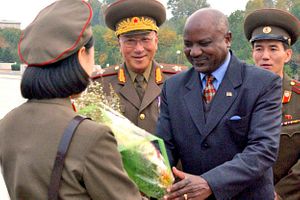When you’re a foreigner living in North Korea, you never know when you’re going to be summoned to attend an event with Kim Jong-un. The invitations come at the last minute, the destinations kept secret. On one such day, we dutifully gathered at Kim Il-sung Square as government minders lined up our cars in neat rows and hustled us onto shuttle buses. We queued for security checks and were ushered to our seats. Whether ambassadors or journalists, as I was, we’re all subject to the same secrecy, and as we settled in to wait for the leader’s arrival, we said our hellos with the shared camaraderie of being foreigners in Pyongyang. There were military attaches from Syria and Iran. A diplomat from Laos and a journalist from China. Ambassadors from Cuba and Russia.
I was an American in North Korea sitting with the Axis of Evil, surrounded by my country’s current and former foes. Well, Toto, I thought: We’re definitely not in Kansas anymore.
In Washington, discussion about North Korea’s foreign policy tends to focus on Pyongyang’s relations with the superpowers in the region: the United States, China, Japan, and Russia.
But working in North Korea, where I served as chief of the AP Pyongyang bureau, I discovered daily that the regime has cultivated intriguing relationships with a host of smaller nations, from Africa to Asia, that serve as threads in the web of the regime’s murky activities abroad. We ate crackers from Vietnam and ramen noodles from Malaysia, and drank champagne from Russia. And in 2010, while covering the North Korean soccer team at the World Cup in South Africa, I ran into a group of sun-beaten North Korean construction workers who had been bused in from Namibia to serve as the cheering squad for their countrymen.

































